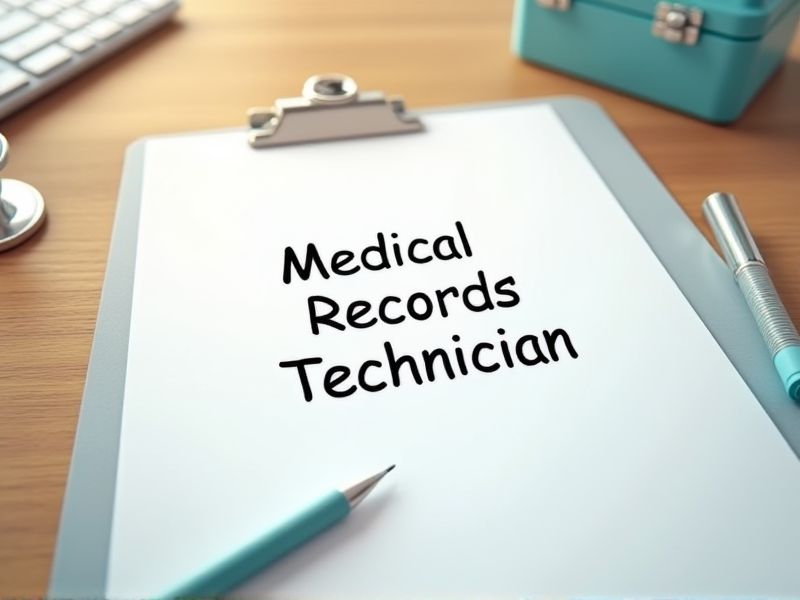
Medical Records Technicians play a crucial role in maintaining and securing patient information, which directly impacts patient care quality and compliance with healthcare regulations. Certifications ensure that these professionals possess the necessary skills to accurately manage and protect critical data, reducing potential risks of data breaches and errors. Employers often require certifications to verify a candidate's proficiency in industry-standard practices and technologies, leading to enhanced operational efficiency and patient safety. Several essential certifications can significantly benefit a Medical Records Technician.
Registered Health Information Technician (RHIT)
The healthcare sector relies on accurate patient data management, and an RHIT certification ensures that a professional possesses the necessary expertise to maintain and verify medical records effectively. As healthcare data grows in complexity, the demand for technicians capable of navigating electronic health systems increases, making RHIT essential for proficiency in such environments. Compliance with healthcare regulations requires meticulous attention to detail, and an RHIT certification equips technicians with knowledge of relevant legal requirements, reducing the risk of non-compliance. Data-driven decision-making in clinical settings necessitates reliable data management, where RHIT-certified professionals contribute to enhancing healthcare delivery through their expertise and precision.
Registered Health Information Administrator (RHIA)
The demand for Registered Health Information Administrators (RHIA) rises due to their expertise in managing comprehensive health information and ensuring data accuracy. Medical Records Technicians benefit from RHIAs' ability to oversee data management systems, leading to improved record accessibility and reliability. RHIAs play a critical role in maintaining compliance with healthcare regulations, reducing the risk of legal issues associated with improper data handling. Their leadership and strategic planning enhance the efficiency of healthcare operations, fostering better patient care and resource management.
Certified Coding Associate (CCA)
The Certified Coding Associate (CCA) credential enhances the credibility of a Medical Records Technician by validating their coding skills in various healthcare settings. With a recognized CCA certification, individuals demonstrate proficiency in ensuring accurate medical coding, which leads to improved billing and reduced claim rejections. Employers often seek certified individuals, which increases job opportunities and potential salary benefits. The certification ensures that technicians stay updated with current coding standards and practices, maintaining the quality and compliance of medical records.
Certified Coding Specialist (CCS)
Employing a Certified Coding Specialist (CCS) enhances accuracy in medical documentation, which directly impacts billing efficiency and reduces claim rejections. The CCS credential indicates a comprehensive understanding of medical coding systems, ensuring compliance with healthcare regulations and standards. A CCS-certified professional contributes to improved data management, benefiting patient care by providing detailed and precise records. Expertise of CCS professionals assists in optimizing hospital revenue cycle management through accurate code assignment and reduced denials.
Certified Electronic Health Records Specialist (CEHRS)
Certified Electronic Health Records Specialists (CEHRS) are needed to ensure accurate and up-to-date electronic health records, which aid in effective patient care and streamline healthcare operations. They help in maintaining compliance with regulations such as HIPAA, thereby safeguarding patient information. CEHRS possess specialized knowledge to troubleshoot and optimize electronic systems, enhancing data accessibility and usability for healthcare providers. Employers often prefer certified specialists for their demonstrated expertise, reducing errors and improving overall health service delivery.
Certified Professional Coder (CPC)
Certified Professional Coder (CPC) ensures accurate coding, which directly impacts billing and reimbursement processes for healthcare facilities. Proper coding by a CPC enhances regulatory compliance, thereby reducing the risk of costly audits and legal issues. Expertise in coding supports efficient medical record management, contributing to better patient care continuity. CPCs bring specialized knowledge that keeps up with coding updates, thus maintaining high standards in medical record accuracy.
Certified Medical Reimbursement Specialist (CMRS)
Medical Records Technicians rely on Certified Medical Reimbursement Specialists to ensure accurate and efficient insurance claim processing, which leads to smoother revenue cycles for healthcare providers. CMRS-certified individuals possess specialized knowledge of medical coding and billing regulations, reducing errors and claim denials. Their expertise acts as a mediator between healthcare providers and insurers, improving communication and ensuring compliance with insurance policies. Enhanced accuracy and compliance directly impact the financial stability of healthcare facilities by minimizing lost revenue due to billing mistakes.
Certified in Healthcare Privacy and Security (CHPS)
CHPS certification ensures that Medical Records Technicians are well-versed in the complexities of patient data privacy and security, which is a critical aspect of their role due to increasing regulations such as HIPAA. Certification enhances a technician's ability to implement robust data protection measures, thereby reducing the risk of data breaches and unauthorized access. Hospitals and healthcare facilities demand that technicians meet these high standards to maintain patient trust and safeguard sensitive health information. Earning CHPS elevates professional credibility, potentially leading to better career opportunities and advancement in the healthcare field.
Certified Health Data Analyst (CHDA)
Certified Health Data Analysts are needed for Medical Records Technicians because they enhance the ability to interpret complex healthcare data accurately. With advanced certification, they ensure compliance with healthcare regulations and standards by analyzing data effectively. Their expertise reduces errors in patient records, leading to improved patient outcomes and more efficient hospital operations. Employing certified analysts can lead to cost savings by streamlining data processes and facilitating data-driven decision-making.
HIPAA Compliance Certification
HIPAA Compliance Certification is critical for a Medical Records Technician because it ensures they handle patient information in accordance with federal privacy laws. This certification educates technicians on safeguarding sensitive health data against unauthorized access and breaches. Compliance minimizes the risk of hefty fines and legal consequences associated with data mishandling. It instills confidence in patients that their medical records are managed securely and professionally.
Summary
When you obtain certifications as a Medical Records Technician, your skills become more validated, increasing job prospects. Employers are inclined to offer higher salaries to certified individuals due to enhanced reliability in handling patients' data. The added qualifications also improve your ability to secure promotions within healthcare institutions. Moreover, certification often leads to improved accuracy in managing medical records, benefiting patient care and organizational efficiency.
